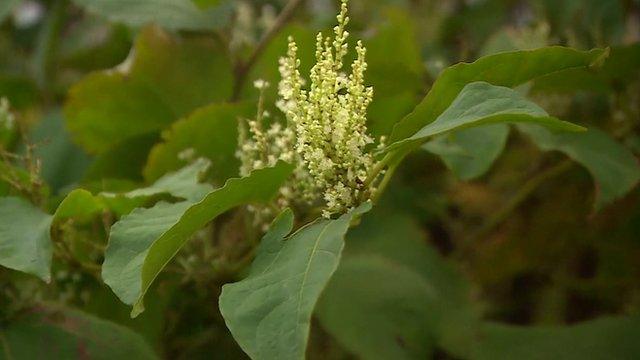Japanese Knotweed: Asbos for failure to control invasive plants
- Published
- comments
Scientists are hoping a small insect may help to bring it under control, as John Maguire reports
People who fail to control the spread of invasive non-native plants such as Japanese Knotweed could be fined or receive anti-social behaviour orders (Asbos), the government says.
The weed is one of the most destructive plants in the UK.
The new rules mean people can now be fined up to £2,500 for failing to control it and other plants such as Himalayan balsam and giant hogweed.
And companies who fall foul of the law can be fined up to £20,000.
Businesses in Scotland and Northern Ireland, external already have a legal responsibility to prevent invasive plants from spreading into the wild or causing a nuisance.
The Home Office says these plants threaten the UK's biodiversity by crowding out native species and destabilising river banks. They can also do immense harm to forestry, farms, roads and buildings.
Very resilient
Japanese knotweed can grow through tarmac and cause structural damage to properties, while giant hogweed can create serious health problems for humans, such as blisters, skin diseases and even blindness.
Japanese knotweed is particularly difficult to eradicate. It is very resilient and regrows vigorously after being cut down.
The most effective method of eradicating it is by using herbicides in the late summer or autumn, when it is close to its flowering stage.
Scientists are hoping psyllids - insects that devour Japanese Knotweed but leave other crops or flowers alone - will also be able to help control the spread of the plant. Field tests are taking place at secret sites.
Property lawyer Laurence Lacey told the BBC that Japanese Knotweed can create problems for people trying to buy or sell a property.
He said: "It can have an adverse impact on valuation. Lenders may refuse to lend on it, and for that reason it's a case of informing yourself as much as possible about whether it's a problem in a property you're looking at."
Mr Lacey also said that if Japanese Knotweed was present in a property, it should be dealt with by a specialist who provides a warranty.
Some have criticised the introduction of penalties such as fines and Asbos as a method of dealing with the problem of invasive plants.
Helen Yemm, who writes the Thorny Problems column in the Telegraph Gardening newspaper section, said the issue had been "whipped up and is playing on people's fear".
She added: "It's sad to have legislation that puts one neighbour against another, and is a sad reflection on our times, really."
- Published19 November 2014

- Published23 June 2014
